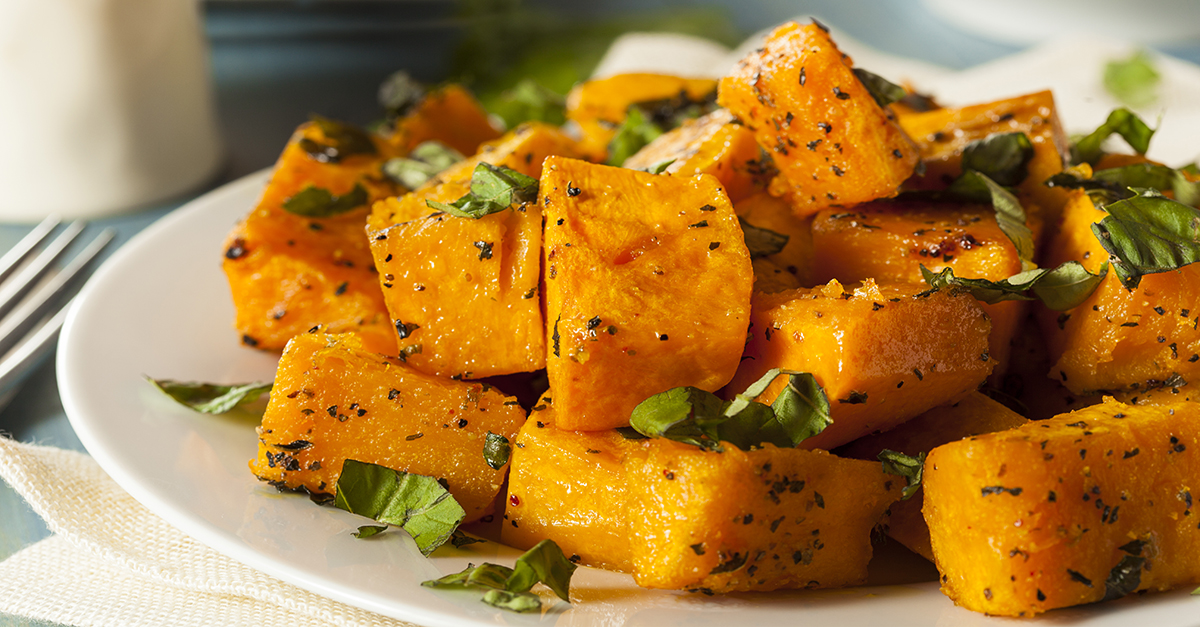Blog & Resources
If you’re tired of eating potatoes all the time and are on the lookout for a new side dish that’s as delish as it is healthy, look no further: Butternut squash is where it’s at. The nutrition and health benefits of butternut squash are aplenty, and there are oodles of different ways you can enjoy it—baked, boiled, sautéed on its own, or added to stir-fries and salads. It’s the perfect side dish to any entree, and also makes for a mouthwatering soup.
Nutrition and Health Benefits of Butternut Squash
1. Prevents high blood pressure
A one-cup serving of butternut squash contains almost 500 mg of potassium, which can help decrease your blood pressure by counteracting the effects of sodium in your diet. Keeping your blood pressure in a healthy range can help you steer clear of serious health issues like heart disease and stroke.
2. Promotes regularity
One cup of butternut squash contains almost 7 grams of fiber, which can help prevent constipation and maintain a healthy digestive tract by supporting healthy bacteria in the gut.
3. Improves eyesight
Butternut squash is literally loaded with vitamin A—one cup of squash has over 350 percent of the recommended daily allowance (RDA), which is uber-important for healthy eyesight. It’s a great source of zeaxanthin and lutein, two powerful antioxidants that can also protect your vision.
4. Keeps bones strong
Since it contains about 17 percent of your RDA of manganese, butternut squash can help your body maintain healthy bone structure, and calcium absorption, and improve the mineral density of the spinal column. Meanwhile, vitamin C takes part in the production of collagen, which is important for building bone mass. Other minerals found in squash, such as iron, folate, and zinc, all contribute to bone health and protect against osteoporosis.
5. Protects your skin
Butternut squash also contains nearly half of your daily dose of vitamin C, which has been linked to healthier skin: A study published in the American Journal of Clinical Nutrition examined links between vitamin C and skin aging in 4,025 women aged 40-74, and found that higher intakes of the vitamin were linked to a lower likelihood of wrinkles and dryness.
6. Boosts immune function
While vitamin C may not cure a common cold, it may help reduce your risk of developing further complications, such as a lung infection or pneumonia. It may also help protect you from other immune system deficiencies, such as cardiovascular disease.
7. Reduces inflammation
Because of its high antioxidant content, butternut squash may have anti-inflammatory effects, helping you to reduce your risk of inflammation-related disorders like rheumatoid arthritis. For example, a study by the University of Manchester found that those who had the highest intake of the antioxidant beta-cryptoxanthin were only half as likely to develop arthritis over a seven- to fifteen-year period, compared to those with a lower intake. Another study published in the journal Cancer Epidemiology Biomarkers and Prevention followed nearly 400,000 people for up to 16 years and found that a higher intake of beta-cryptoxanthin also reduced the risk of lung cancer by more than 30 percent.
8. Aids in weight loss
With less than 100 calories, 26 carbohydrates, and almost no fat in a one-cup serving, it goes without saying that butternut squash is the cheese to your diet’s macaroni. The fiber content alone helps increase satiety (the feeling of fullness), which can help you manage your weight. Add this nutrition-packed food to a larger portion of your meals, and your weight scale won’t even know you’re standing on it. (Kidding. Sort of.)
Courtesy Organic Authority: by KRISSY BRADY
